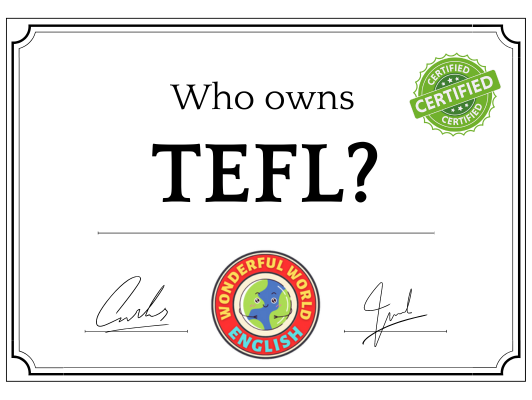Contents
Toggle
Meet David De’ Ath, founder, editor, and writer at Wonderful World English. With his extensive background as an English teacher, David provides valuable insights and practical tips on ESL for students and teachers alike.
The term TEFL, which stands for Teaching English as a Foreign Language, encompasses a vast industry in which various stakeholders hold ownership over different aspects.
While no single entity owns the concept of TEFL as a whole, several organizations and individuals maintain proprietary rights to distinct TEFL programs, certifications, and teaching methodologies.
Notably, The TEFL Org, one of the well-recognized figures in this industry, was established by experienced EFL teachers Jennifer MacKenzie and Joe Hallwood.
Ownership within the TEFL domain can refer to the rights to curricular content, the structure of certification programs, and the administration of teaching services worldwide.
Accredited institutions like The TEFL Org guide aspiring educators through the process of becoming certified to teach English abroad.
Various TEFL certification providers have emerged across the globe, each with its own set of courses designed to equip teachers with the necessary skills to instruct non-native English speakers.

Exploring TEFL Ownership
The field of TEFL is diverse and involves various entities.
Primarily, TEFL certifications are offered by a multitude of organizations, each owning its proprietary courses and materials.
Ownership can range from private companies to educational institutions, with no single entity governing the entire TEFL industry.
Accredited providers are those with a recognized accrediting body validating their TEFL courses. Such accreditation ensures that the course material, teacher training, and qualifications provided meet specific standards.
The accreditation process is crucial in maintaining the quality of TEFL training and in providing assurance to prospective TEFL teachers.
A standard course offering is the 120-hour TEFL course, which may be available as a classroom TEFL course or an online TEFL course.
Ownership of these courses is held by the respective companies or institutions that designed them.
When teachers choose a course, considering whether the provider has appropriate accreditation can influence the validity and acceptance of their TEFL qualification globally.
Training and qualifications in TEFL may encompass additional components, like a practicum, which offers teachers hands-on experience.
While online courses provide flexibility, in-person training may enrich the teacher’s practical skills.
TESOL, CELTA, and TEFL are all qualifications enabling English language education, and their ownership depends on the organization or educational entity that administers the training.
It is not uncommon for universities or colleges to have TEFL training programs, which might offer a degree in TEFL or related fields such as EFL.
These academically oriented TEFL programs are owned by the institutions providing them.

TEFL Opportunities and Career Prospects
Teaching English as a Foreign Language (TEFL) offers a breadth of opportunities and career advancement for educators around the globe.
Below, specific details on employment prospects, career growth, and essential resources in the TEFL industry are outlined.
Global Demand and Employment
The demand to teach English abroad is robust and spans across public schools, language centers, and private institutions.
As digital technology advances, teach English online positions are also flourishing, providing opportunities for virtual classroom engagement and the flexibility coveted by digital nomads.
Countries like China, the UK, the USA, and South Africa are notable for their high demand for English teachers.
Advancing in TEFL
Advancement in the field of TEFL can often depend on the acquisition of additional qualifications, such as a Level 5 TEFL certificate or a degree in Teaching English as a Second Language (TESL).
Experienced tutors can seek senior roles, such as ADOS (Assistant Director of Studies) or DOS (Director of Studies), with the right mixture of experience, skills, and further education.
Certification and Resources
To begin a TEFL journey, one typically needs to become TEFL certified through a course provider recognized for TEFL accreditation.
This could be a self-paced online study or a more practical, classroom-based course.
Various universities and TEFL providers offer such certifications, which are internationally recognized and can considerably enhance one’s chances in the TEFL job market.
Navigating the Market
Potential TEFL educators should tap into job centers and recruiters specializing in placing English language learners with schools and language institutes.
Furthermore, being successful in the TEFL industry may require fluency in English, a solid knowledge of pedagogy, and the cultural experience to adapt to different teaching environments.
TEFL Org and similar organizations often provide a range of support services and advice to help graduates find work.
TEFL Support and Development
Continued support and development are key to maintaining a competitive edge in the TEFL industry.
Many organizations offer mentoring, ongoing teacher training, and career advice.
Additionally, resources like weekly webinars and job placement assistance can be invaluable in ensuring teachers remain abreast of changes in regulation and industry standards.
By researching, understanding, and preparing for what lies ahead, educators can turn their passion for teaching into a rewarding TEFL adventure and career.
For more insights into TEFL certificates and how you can get your hands on on one, check out the link below!
Related: TEFL Certificates: Your Guide to Teaching English Abroad

Conclusion
In conclusion, the TEFL industry is a complex and multifaceted field that offers numerous opportunities for educators worldwide.
While no single entity controls the entire TEFL sector, various organizations and educational institutions own specific TEFL programs, certifications, and methodologies.
Entities like The TEFL Org play significant roles in guiding teachers through certification and career development.
Accreditation stands out as a critical factor in ensuring the quality and recognition of TEFL courses globally.
Whether through online platforms or in-person classes, TEFL educators have the chance to advance their careers by acquiring additional qualifications and leveraging the global demand for English language instruction.
With the right preparation, certification, and resources, teaching English as a foreign language can be a fulfilling and dynamic career path.
We hope you found value in this information.
Have a wonderful day!
Image Attribution: All images licensed via canva.com





